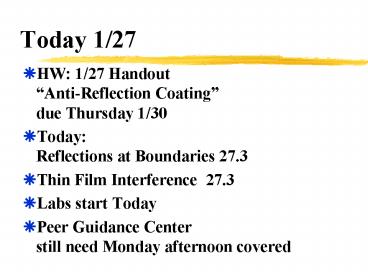Today 1/27 PowerPoint PPT Presentation
Title: Today 1/27
1
Today 1/27
- HW 1/27 Handout Anti-Reflection Coating due
Thursday 1/30 - TodayReflections at Boundaries 27.3
- Thin Film Interference 27.3
- Labs start Today
- Peer Guidance Centerstill need Monday afternoon
covered
2
Next Weeks Lab Microwaves
- A wave in the electric field
- Reflection and transmission from and through wood
- Reflection from metal (why metal is bad in your
microwave) - Polarization (see section 24.6)
- Interference (Youngs Double Slit)
3
Light to Heavy
Both transmission and reflection
Boundary feels like a fixed end to the light
string
Reflection just like fixed end, inverted
Transmitted wavelength has the same shape except
its shorter in length because it travels slower
than the incoming wave.
Slower, so not as far from boundary
Shorter, bunched up
Inverted wave
4
Heavy to Light
Both transmission and reflection
Boundary feels like a free end to the heavy string
Reflection just like free end, not inverted
Transmitted wavelength has the same shape except
its longer in length because it travels faster
than the incoming wave.
Faster, farther from boundary
Longer, spread out
Wave not inverted
5
Light Glass to Air
Faster, farther from boundary
Longer, spread out
Same as incoming wave
Light Air to Glass
Slower, so not as far from boundary
Shorter, bunched up
Inverted wave
6
Thin Films
Two reflections, front and back two sources!
7
Thin Films
A radio antenna broadcasts at a frequency of
93.7?MHz (? 3.2 m). A mirror 1.6?m away
reflects the signal. Where is the reception good
along the dotted line?
PLD ? at the X
( ?)
PLD ? all along the dotted line so constructive
everywhere.
1.6 m
8
Thin Films
A radio antenna broadcasts at a frequency of
93.7?MHz (? 3.2 m). A mirror 1.6?m away
reflects the signal. Where is the reception good
along the dotted line?
Crest lines up with crest and the waves arrive in
phase, constructive interference.
Trough in Trough out
1.6 m
Now move the mirror back
9
Thin Films
Twin radio antennas broadcast in phase at a
frequency of 93.7?MHz (? 3.2 m).
Crest lines up with trough and the waves arrive
out of phase, destructive interference.
Trough in Trough out
2.4 m
Now move the mirror back
Now cause a phase shift at the boundary, turn
crest into trough
10
Thin Films
Twin radio antennas broadcast in phase at a
frequency of 93.7?MHz (? 3.2 m).
Crest lines up with crest and the waves arrive in
phase, constructive interference.
Phase shiftedTrough in Crest out
2.4 m
Now cause a phase shift at the boundary, turn
crest into trough
11
Thin Films
Wavelength (?)Film thickness (PLD)Different ?
in filmPhase shifts at boundaries
Interference
12
Index of refraction (n)
Light slows down as it passes through glass,
water, or any clear material.
Index of refraction says how much.
When the wave slows down it gets bunched up and
has a shorter wavelength.
When the wave exits the medium it returns to its
original speed and wavelength.
13
Finding ? in materials
n1 1.0
v1 c/n1 c 3 x 108 m/s
Wavelength is shorter but frequency is the same
in any material.
If v changes by a factor 1/n and f remains
constant then ? must change by the factor 1/n
also.
v2 c/n2 2.3 x 108 m/s
Waves obey the equationv ?f
?2 ?1/n2
Just a proportion
n2 1.33
14
Example
Light with ? 675 nm enters glass with n 1.5.
What is the wavelength in the glass?
?glass ?/n
?glass 675 nm/1.5 450 nm
What is the wavelength after it exits the glass?
? 675 nm
15
Thin Films
The wavelength is different in the film.
Wavelength (?)Film thickness (PLD)Index of
refraction (n)Phase shifts at boundaries
16
Thin Films
PLD 2t, t film thickness
Wavelength (?)Film thickness (PLD)Index of
refraction (n)Phase shifts at boundaries
t
17
Thin Films
Sometimes reflections include phase shifts upon
reflection
Phase shifts - the tricky part
Crest in crest out no phase shift
Crest in trough out 1/2 ? phase shift
Phase Shift?
Yes, bouncing off higher n
Phase Shift?
No, bouncing off lower n
Air
Glass
Air

